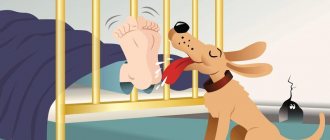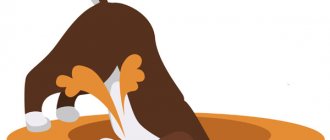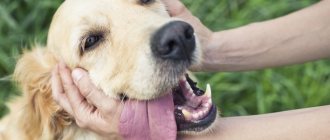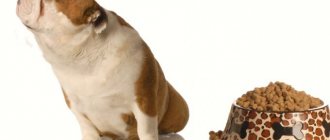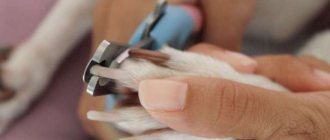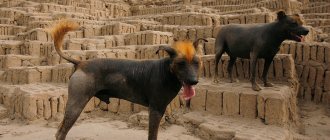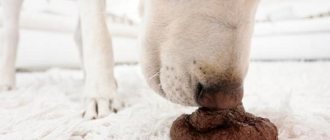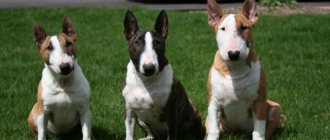If you have pets, chances are you know first-hand the challenges associated with caring for them. Dogs, for example, often scratch a bed or chair: right before they lie down in a comfortable soft place, they dig at it extensively and then lie down. They will paw, scratch, roll around on the bed, and even spin around frantically until they finally decide to just lie down.
Sometimes this behavior from your four-legged dog results in a simple scratch, and sometimes your cute new fleece-lined dog bed ends up in tatters. Having seen similar habits in my dog, my wife wondered: why does something like this happen? Indeed, how can this be explained? I am happy to share with you my own research on this topic.
Why does a dog dig up the floor in an apartment?
To minimize the damage caused by a dog, owners should provide their pet with quality chew toys and monitor it at all times.
Yelling at your dog can create new problems in your relationship. You could offer your dog something else to chew on. Since your dog chews on soft objects, this could be a soft rubber toy. Gradually offer her harder toys. They must be of high quality so as not to harm the dog. Monitor your dog's chewing toy behavior as none of them are 100% safe. A good result comes from offering the dog toys of different types and materials, so that he can choose the one that suits him at the moment.
Dogs also sometimes exhibit strange behavior, especially those that were not properly cared for as puppies. Thus, some of them, already as adults, may unconsciously look for soft objects to suck and chew. This behavior, we repeat, is unconscious. Therefore, you should consult your veterinarian.
It is very important to focus the attention of young dogs who are obsessed with the desire to chew and chew on their own toys. This is the only opportunity to develop correct behavior in your dog in the house, as well as keep its teeth in order.
Excess energy
Some dogs are quite hyper by nature, and if they can't get rid of everything that is holding their energy back, they become a bit creative, which means they tend to develop certain behavioral problems as a result. Digging and scratching on your expensive new carpet is just one of them. If this is the case, you need to make sure that they are given loads of exercise and mental stimulation. When you leave the house, leaving interesting interactive toys for them to play with will reduce the boredom factor and help stop your pet from having fun on your carpets.
How to break the habit?
Having discovered dug holes, damaged flower beds and beds, the owner wonders how to stop the dog from digging. Experienced dog breeders and dog handlers recommend the following measures to correct unwanted behavior:
- regularly exterminate rodents on the territory of a country house;
- You should constantly play and exercise with your pet. Active walks and training distract animals from unwanted behavior. Communication with relatives during a walk will benefit the dog;
- To prevent the dog from getting bored in the absence of the owner, a variety of toys, including interactive ones, will help brighten up his leisure time;
- install a special pool for the summer period where the animal can swim in the heat;
Elimination of causes
If you understand the peculiarities of the psychology of your own dog, then this is quite simple. We list the most common options:
- if the dog digs a hole because of the heat, then keep him at home during the daytime, where there is air conditioning, or fill him with a children's pool in the yard, where he can splash from time to time;
- if the dachshund dug through the entire flowerbed next to the house in search of a mouse, then invite the appropriate service that can deal with the annoying rodent;
- dogs are restless animals; if they lack activity, then a dug hole is not the worst thing in the world. Walk with him more, and the habit will go away on its own, especially for those individuals who are accustomed to taking part in sporting events;
- male dogs who dug loopholes under the fence require immediate mating or castration;
- communicate more with your pet, try to walk it with friends who also have dogs, this eliminates the animal’s need to communicate with its own kind;
- Another radical method of eliminating the causes of such behavior can be an ordinary wire mesh that is buried around the perimeter of the site. The trench for laying the network should be 0.5 m deep and 1 m wide. The net is attached to the fence approximately 30 cm from the beginning. As a result, it will turn out that the lower part of the net will fall into the trench. When the dog breaks through again, he will inevitably run into her and stop his work.
[custom_ads_shortcode2]
Peculiarities
According to the veterinarian, it is very important to distinguish between normal bed scratching and attempting to dig at the bed. Sometimes this behavior can mean different things, for example, the bitch is pregnant. In fact, nesting is part of an ingrained maternal instinct, as mothers naturally want to create a safe, protected place for their newborns. This will involve moving the bed (and even various materials such as blankets or soft linens) to a more distant location, as well as extensive scratching.
Digging holes after childbirth
The owner often encounters unusual behavior of the animal during the period before and after childbirth. Many experienced dog breeders determine the approaching labor of a female by the fact that she begins to dig in the litter, floor, and ground. This phenomenon is associated with instinctive behavior. The dog senses the approaching important moment and prepares a cozy and safe nest for the arrival of newborns.
Experienced dog breeders believe that the reason why a dog digs after giving birth is an ancient instinct. In the wild, even predators have a lot of enemies when their offspring appear and are raised. It is easy to find the nest by smell. Therefore, if the litter, in the opinion of the new mother, emits a strong odor and can attract potential enemies, then she will try to bury the source of the smell deeper.
What can I do to prevent my dog from digging up beds and flower beds?
When an animal is so keen on digging holes that it jeopardizes the future harvest and causes significant damage to plantings. In this case, the owner should listen to the advice of professionals on how to wean a dog from digging beds. To solve the problem, you can use the following recommendations:
- it is necessary to regularly restrain the animal with prohibiting commands when attempting to dig holes and trenches. If the animal stops its actions, it should be called and rewarded;
- boards, bricks, curb stones, etc. should be placed at the border of crops and plantings. When walking through the garden with your pet, you need to praise him if he does not step over the fence and stop attempts to go beyond the fenced area with a stern voice;
- If the dog stubbornly continues to damage the plantings, then you can resort to radical measures. An inflated balloon should be placed in the favorite place where the dog most often digs. A sharp sound will cause a negative reaction in the pet at the time of digging and will discourage digging in the beds;
- An effective method in the question of how to wean a dog from digging flower beds is this. In the area where valuable plants are planted, it is necessary to place an irrigation system and equip it with a motion sensor. As soon as the pet approaches the plantings, cold water will cool the fidget's ardor;
- The use of electric or vibrating collars can help solve the problem. An unpleasant signal, which is given when an animal acts undesirably, quickly weans the dog from digging the soil in the flower beds.
Having discovered a tendency in his pet to dig holes, the owner must understand the nature of this phenomenon. A common cause of undesirable action is the natural instincts of reproduction, home protection and feeding factors. In some cases, identifying it will help the owner correct the pet’s behavior and wean it from a habit that is destructive to plantings.
Construction of a rookery or cache
If a dog digs a hole only in hot weather, and completely ignores the ground in autumn, winter and spring, then the reason for this is that it is creating a comfortable bed for itself. Having removed the top layer of soil, the pet gets to the lower, cooler layer, which saves the furry friend from overheating. To avoid this, just spread a damp cloth near the booth or place a trough with cool water in the shade so that the dog can cool off in it.
For some dogs, their instinct is to hide food for a rainy day. For these purposes, a hole is dug in the ground, where the animal hides a bone or a piece of bread “in reserve.” And then he checks it ten times a day, fearing that someone might steal.
[custom_ads_shortcode3]
How to stop a dog from digging in the bed
Even the most loving owners are unlikely to put up with torn sheets, blankets or even damaged mattresses. Many owners react sharply to the presence of hair and saliva on their bed linen... and this is not surprising. Does your dog dig in the bed and you have decided to eradicate this habit? Be patient - it is possible, but it will require enterprise and time.
Let us immediately state that it is impossible to wean a dog from survival instincts , and if you try, most likely you will traumatize the pet’s psyche. Basically, there are three options:
- Come to terms with it.
- Strictly monitor the dog and do not let it near the bed, and if you overlooked it, accept it.
- Redirect your pet's actions in a peaceful direction.
We are only interested in the last option, and in order to begin implementing it, we need to complete a number of preparatory measures. Provide a comfortable, quiet and, if necessary, closed place for your pet to sleep. Some dogs don't feel safe without a roof; to remedy this problem, you can buy or make a makeshift canopy.
Do you have space, but your dog keeps digging up your bed? The next step is where to dig. You can put a cardboard box with rags next to the lounger; believe me, dogs are not stupid and the pet will understand why she was given such a gift. As soon as the four-legged climbs onto the bed, say Fu and take him to the box with rags. If the pet is at least interested in the allowed place or stomps around in it, praise generously.
Note! Some dogs are much better at digging in improvised holes with paper (for example, crumpled newspapers or pieces of wallpaper). The rustling will continue, but your bed will remain unharmed.
Did not help? Then you will need a bulky soft item or a piece of thick fabric (large). The idea is that this needs to be piled on top of the dog's bed so that it forms a folded mound. This is, perhaps, a redistribution of the desires of all “den” dogs.
Note! As soon as the pet has an alternative option to digging in the bed, any attempts to repeat the usual ritual should be stopped. That is, either the four-legged animal should be prohibited from climbing onto the bed, or allowed to rest on the bed, but attempts to dig should be stopped. Until you are sure that all conditions have been created for the animal to feel safe, you cannot scold him for digging the bed!
Took the owner's sleeping place
Good job for you, master
If your four-legged pet is accustomed to sleeping at the foot of the bed, his choice of a more comfortable place does not promise any changes in life. The animal is either trying to get comfortable, or has decided to compete with the owner for dominance in the “pack”. In this case, the attempt to riot should be immediately stopped, and the troublemaker should be removed to the floor. Your place is your place, and there are no exceptions.
It’s another matter when a peaceful dog suddenly starts fussing, doesn’t let you lie down, pushes you out of bed, whines, gets agitated and calls you to the door. This behavior may indicate danger to you and your household.
First of all, check the apartment for fire, gas leaks or other damage.
Nothing was found, but is your soul restless? Then use the ancient technique of our ancestors. The belief advises you to go outside without looking, take out the first coin you come across from your wallet and throw it with your left hand over the fence with the words: “Paid!” After this, return to the house and do not eat or drink anything for three hours. If the dog’s strange behavior repeats from night to night, urgently take it to the doctor - perhaps the animal is simply sick and suffering.
It's about instinct
So, why do dogs dig their bed before they lie down? It turns out that this is a deeply instinctive trait, embedded in every puppy since ancient times. A veterinarian I know told his wife that dogs scratch their beds because they want to “mark the space with their unique scent.”
Essentially, we are dealing with a deeply rooted territorial instinct. Just as dogs urinate on objects, believing them to be theirs, they scratch and dig at various objects with their paws for the same reason. According to the veterinarian, pets have glands in their paws that leave a special smell: thus, their bed or any other surface is considered their territory.
As a result, dogs are proud to smell the place they have made their own. Of course, if your pet destroys your bed, just say “Ugh!” - so he will understand that this thing is not his property. In this case, be sure to provide him with his own bed.
Fear and anxiety
You may find that your dog starts scratching and digging in the carpet when they hear something outside the house. It may be their response to what they find threatening or worrying that is causing this reaction. However, dogs often scratch carpets when their owners leave the house, this is their way of showing that they are unhappy with the fact that they are left on their own, which is called anxiety sharing. To help them avoid doing this, it may be worth working with a dog behavior trainer nearby who can get to the root of the problem, and then gently break the habit so your dog doesn't destroy all your carpets.
How to get rid of this situation?
There are only two ways to actually eliminate the problem of your pet digging holes.
The first way is to get rid of the root cause of which the dog acts this way, and the second is to teach it to dig holes in another place where this process will not cause inconvenience to the owner of the four-legged friend.
Feeling of curiosity
Since dogs are very inquisitive animals that acquire a lot of information through scents, they search for and find objects of interest to them.
In addition, during the process of seeking information, brain activity is stimulated.
In addition to this factor, a dog can engage in digging when it lacks physical activity, which is typical for sporting breeds.A look into the past
What else could prompt your pet to such actions, apart from territorial instinct? It is possible that the scratching and digging of the dog bed is due to behaviors inherited from their ancestors. Wild dogs scratched the leaves that made up their “bed” and also dug in the dirt just to create a more comfortable place.
Moreover, creating this type of nest made wild animals feel more protected from predators: they even used certain materials to be in the most peaceful place. Also, this pet behavior may be related to the weather: digging the soil warms the dogs and protects them from rain.
Additionally
The specialist also recommended filming any behavior your dog exhibits that seems unusual or different from normal. When they show any unusual activity, “it's important to capture it on video so the veterinarian can analyze your four-legged friend's behavior. When trying to evaluate a dog's behavior, such as scratching or anything else that seems abnormal, it is very helpful for veterinarians to see it on video."
Although dogs scratch their beds and make nests in your humble home, what motivates them to do such things speaks to their desire for comfort and protection. Experts agree that dogs are driven by instinct, which helps them feel more confident in their territory.
Behavioral characteristics of dogs
Despite the fact that in some cases the dog actively rubs against various surfaces due to various disorders or diseases, there is no need to panic if you see that your pet is excessively interacting with the ground, floor or pieces of furniture. As a rule, in such cases, owners believe that their pet has dermatological problems and are often wrong.
First of all, a dog may rub against an object simply because it likes the smell of it. If for such “procedures” the animal chooses, for example, one carpet and completely ignores other objects, there is clearly no need to worry.
Moreover, it is possible that when a dog rubs its muzzle or lips against something, there is a high probability that it is simply trying to cleanse itself of food debris. As a rule, in such cases, pets prefer soft objects that are within reach. Thus, small dogs may often rub against their owners' clothes hanging on hangers in the hallway.
Many dog owners object, saying that during such “rituals” the animal often squeals, whines or grumbles. Don't take this as a sign of pain or anxiety. Rather, on the contrary, the pet often enjoys it, sometimes simultaneously stretching its back and wagging its tail. Some animals prefer to help themselves with their paws or rest their nose on hard surfaces, which is also completely normal.
Compulsive, obsessive behavior
Many dogs develop compulsive and obsessive behavior as a result of boredom. Digging and scratching in carpets is just one of them, and it usually happens when dogs are not given enough exercise and mental stimulation. High-energy dogs are more likely to develop this behavior when they stay on their devices for too long. More sensitive characters may begin to do this because they find the environment to be too stressful for them. If you need help correcting the compulsive behavior your dog has developed, there's no shame in enlisting the help of a professional behaviorist who can help your dog overcome his problems a little faster than you can yourself.
Attempts to free the anal sinuses
The physiological features of dogs suggest the presence of special glands called paraanal glands (anal sacs). Essentially, these glands are two small sacs that are located directly at the exit of the animal's anus. These glands secrete a special substance that is thick and has an extremely repulsive odor. Actually, the contents of the anal sacs consist of various bacteria, secretions of the sebaceous and apocrine glands. As a rule, the shade of the secreted secretion can vary from yellowish to brown.
Some mammals are able to release their anal sacs at will, mainly to mark something with their own scent or for self-defense, as the skunk does. Dogs have long lost the ability to empty these tonsils purposefully.
If the dog is completely healthy and no abnormalities are observed, the emptying of the paraanal glands occurs naturally during defecation. But if the sacs are overcrowded, they noticeably increase in size, then become inflamed and cause severe discomfort in the dog, including while walking. That is why sometimes owners can observe how the dog rubs its butt on the floor or ground, trying to get rid of the accumulated secretion. Associated symptoms of blockage of the paraanal glands are frequent licking of the anus and pressing it with the tail.
What does this mean?
If a dog rubs against the floor or ground in an attempt to clean out the glands, and the owner ignores this symptom, there is a chance that an abscess will form, which will eventually rupture as an abscess. Such incidents are usually very painful, moreover, naturally, the dog will stain everything that is nearby with the foul liquid.
It should be noted that such cases are not rare, but quite often they are mistaken for anal bleeding. If you detect the presence of an abscess in time, you should immediately consult a doctor - in such a situation only a specialist can provide assistance.
Change of conditions of detention
Before you give up and give up gardening, you should try changing the conditions.
Permitted places for digging
Most owners have been able to control their pet's destructive behavior by providing approved digging areas. Choose a place in the yard and fence it off like a children's sandbox.
Reward your dog every time he digs in an allowed area. If the cause of destructive behavior is a highly developed instinct or boredom, the dog will quickly get used to the sandbox.
Cooling place in hot weather
If your pet drips only in hot weather, the reason for the behavior is the need to cool down. A fresh layer of soil has a lower temperature. The dog digs up the dry soil and lies down on the damp ground, which greatly alleviates its condition.
If you notice that the dog is actively digging the ground in the summer, a canopy will be equipped for it. If you have the opportunity, place a bathtub or large container of water in the yard so your dog can cool off at any time. If there is a place for swimming, the problem with digging the ground will most likely be solved on the first day.
Get rid of rodents
Owners of hunting breeds will have to ensure that there are no pests on the property. You will not teach a dog to dig if it hears the movement of rodents. To repel rodents and other parasites, special ultrasonic devices are used that produce a sound inaudible to humans and dogs.
Carefully observe your pet's behavior while the device is operating, as some hunting breeds have very acute hearing and can respond to even the highest sound frequencies.
Get used to digging outside the garden
Some dogs dig holes because they enjoy the activity or enjoy the duration of the physical activity. Take your pet for walks more often and allow him to dig holes in the ground outside the site.
Encourage your pet when he digs during a walk. If the dog managed to find a root or some kind of trophy, make sure that it is not dangerous. Try to walk your dog intensively so that it returns home tired.
The urge to escape
Some dogs try to escape at the first opportunity. Digging a hole under the fence is a great escape plan. If you notice that holes appear only along the fence, do not ignore the problem! Bury thin metal mesh along the fence to discourage digging.
Large rocks placed along the fence help dampen the dog's enthusiasm. Many owners have overcome their pet's bad habit by making the fence blank. When a dog does not see what is happening on the street, it partially loses interest in escaping.
The more temptations your pet has, the harder it is for him to resist the urge to dig. Fresh soil can be an incentive to dig holes. If you have recently dug up your beds or garden, temporarily limit your pet's movement.
Dogs often drip in the same place because they previously buried a bone or other valuable trophy. Many pets dig up the trophy, admire it, and bury it again. This algorithm can be repeated dozens of times until the pet finds a more valuable trophy and buries it.
The desire to stock up “for a rainy day”
Another reason why a dog digs a hole is the desire to hide “yummy” food for future use. She buries excess food in the ground, and after a while digs it up and eats it, which often leads to poisoning.
Interestingly, some pets can run around the area for hours in search of a secluded place for their supplies, and then, having buried food in the ground, constantly check the safety of their treasure.
Abnormal behavior due to illness
If your dog has never scratched carpets before and they suddenly start doing it, they may not be feeling well. They may even have developed some kind of neurological disorder, and the sooner a vet examines them, the better. You may find that your pet has a thyroid imbalance, which can cause dogs to become a bit destructive. In the worst case scenario, they may develop a brain tumor, which can also cause abnormal behavior in dogs. Your veterinarian will be able to run tests to find out what's going on before recommending treatment.

